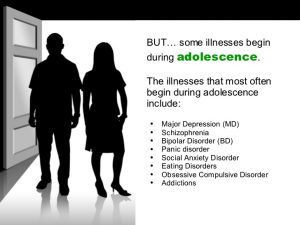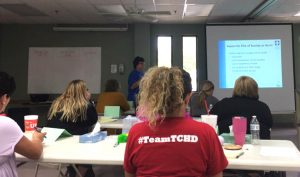Health Department educates youth leaders on teen mental health
By Holly Eitenmiller For Chronicle Media — October 18, 2017 It’s usually not difficult for most people to recognize and respond to a medical emergency. A mental health crisis is a different matter, however, particularly among youths.
It’s usually not difficult for most people to recognize and respond to a medical emergency. A mental health crisis is a different matter, however, particularly among youths.
On Oct. 26 the Tazewell County Health Department will host a Youth Mental Health First Aid Class for anyone who regularly connects with youths between the ages of 12-18.
“It’s about education. This class is for coaches, pastors, teachers, parents, adult siblings; any adult who has regularly interactions with youths,” said Sara Sparkman, TCHD Communications Manager. “This course isn’t designed to teach people how to diagnose a mental illness. It teaches them to recognize if a kid is having mental health challenge or crisis, and how to keep them and offer resources.
The Mental Health First Aid program, which focuses on adults as well as youths, began in Australia in 2001, and more than 22 countries have since adapted and implemented its programs.
TCHD nurses Kim Gudzinskas and Erica Metzker are program-certified trainers, and classes have been going on at the health department since 2015.
Gudzinskas said spotting mental health crises in youths can be particularly challenging. “It can be easy to red flag what might be normal adolescent behavior,” Gudzinskas explained. “It very much depends on the individual and changes in their behavior.”
A youth who has been sullen, quiet and introverted, then suddenly acts as if everything is fine “may have a plan,” for example. The same applies to the straight arrow student whose grades start slipping, or the athlete who begins dramatically losing weight.

According to professionals at the Tazewell County Health Department, people are more likely to encounter someone in an emotional or mental crisis than someone having a heart attack. TCHD periodically hosts mental health first aid training courses and a Youth Mental Health First Aid course is scheduled for Oct 26. (Photo by Holly Eitenmiller / for Chronicle Media)
“The earlier a youth gets help, the better,” she said. “Truly listening is the big thing, and we encourage people to ask questions, especially to ask if they are considering suicide. But be prepared for an answer.”
When young people feel safe, Gudzinskas said, they want to be asked such questions. Promises, however, are not to be made that may endanger the welfare of the child.
“Never make promises you can’t keep, like, ‘Promise you won’t tell my parents,'” she said. “It’s about openness and honesty.”
And it’s also about de-stigmatizing mental illness and dismantling the negative connotations associated with mental health issues.
“Another thing with Mental Health First Aid is ‘Stop the Stigma’. A mental illness is brain illness, but people treat it as just weird or a weakness,” Gudzinskas said. “People with mental illness can’t help it, it’s biological.”
In addition to suicide intervention, the training also helps adults recognize the risk factors and warning signs of many other mental health problems, like depression, anxiety, substance abuse, psychosis, ADHD and eating disorders.
ALGEE is The Youth Mental Health First Aid program’s five-step action plan: “Assess for risk of suicide or harm, Listen non-judgmentally; Give reassurance and information; Encourage appropriate professional help; Encourage self-help and other support strategies.”
Eric Foster, Vice President for Substance Abuse Policy at the Illinois Association for Behavioral Health has taken both the youth and adult mental health courses.
“With youth, the emphasis is on early identification to prevent long-term chronic illness,” Foster said. “If you can intervene earlier as the brain is developing, there’s more opportunity for intervention.”
Around 38 percent of youths with a mental health crisis or condition get the help they need, he said, and early intervention is key. “The more we focus on the needs of youths and early onset, the more we identify that these conditions exist.”
Class information
The Oct. 26 class runs from 8 a.m. – 5 p.m. at the Tazewell County Health Dept. on Rt. 9 in Tremont. Participation is $50 and includes training and a manual, lunch and light snacks. Registration may be completed by phone at (309) 925-5511, Ext. 338 or by email ateconnett@tchd.net.
For information on all of the Mental Health First Aid programs, where to find additional courses and the steps it takes to become an instructor, visit www.mentalhealthfirstaid.org/.
—- Tazewell Health Department educates youth leaders on teen mental health —



